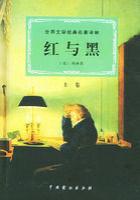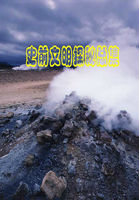Over the mantel in the elder Corey's room hung a portrait which he had painted of his own father, and now he stood a moment and looked at this as if struck by something novel in it.The resemblance between his son and the old India merchant, who had followed the trade from Salem to Boston when the larger city drew it away from the smaller, must have been what struck him.Grandfather and grandson had both the Roman nose which appears to have flourished chiefly at the formative period of the republic, and which occurs more rarely in the descendants of the conscript fathers, though it still characterises the profiles of a good many Boston ladies.Bromfield Corey had not inherited it, and he had made his straight nose his defence when the old merchant accused him of a want of energy.He said, "What could a man do whose unnatural father had left his own nose away from him?" This amused but did not satisfy the merchant."You must do something," he said; "and it's for you to choose.If you don't like the India trade, go into something else.Or, take up law or medicine.
No Corey yet ever proposed to do nothing." "Ah, then, it's quite time one of us made a beginning," urged the man who was then young, and who was now old, looking into the somewhat fierce eyes of his father's portrait.
He had inherited as little of the fierceness as of the nose, and there was nothing predatory in his son either, though the aquiline beak had come down to him in such force.
Bromfield Corey liked his son Tom for the gentleness which tempered his energy.
"Well let us compromise," he seemed to be saying to his father's portrait."I will travel." "Travel? How long?"the keen eyes demanded."Oh, indefinitely.I won't be hard with you, father." He could see the eyes soften, and the smile of yielding come over his father's face;the merchant could not resist a son who was so much like his dead mother.There was some vague understanding between them that Bromfield Corey was to come back and go into business after a time, but he never did so.
He travelled about over Europe, and travelled handsomely, frequenting good society everywhere, and getting himself presented at several courts, at a period when it was a distinction to do so.He had always sketched, and with his father's leave he fixed himself at Rome, where he remained studying art and rounding the being inherited from his Yankee progenitors, till there was very little left of the ancestral angularities.
After ten years he came home and painted that portrait of his father.It was very good, if a little amateurish, and he might have made himself a name as a painter of portraits if he had not had so much money.But he had plenty of money, though by this time he was married and beginning to have a family.It was absurd for him to paint portraits for pay, and ridiculous to paint them for nothing; so he did not paint them at all.
He continued a dilettante, never quite abandoning his art, but working at it fitfully, and talking more about it than working at it.He had his theory of Titian's method;and now and then a Bostonian insisted upon buying a picture of him.After a while he hung it more and more inconspicuously, and said apologetically, "Oh yes! that's one of Bromfield Corey's things.It has nice qualities, but it's amateurish."In process of time the money seemed less abundant.
There were shrinkages of one kind and another, and living had grown much more expensive and luxurious.
For many years he talked about going back to Rome, but he never went, and his children grew up in the usual way.
Before he knew it his son had him out to his class-day spread at Harvard, and then he had his son on his hands.
The son made various unsuccessful provisions for himself, and still continued upon his father's hands, to their common dissatisfaction, though it was chiefly the younger who repined.He had the Roman nose and the energy without the opportunity, and at one of the reversions his father said to him, "You ought not to have that nose, Tom;then you would do very well.You would go and travel, as I did."LAPHAM and his wife continued talking after he had quelled the disturbance in his daughters' room overhead;and their talk was not altogether of the new house.
"I tell you," he said, "if I had that fellow in the business with me I would make a man of him.""Well, Silas Lapham," returned his wife, "I do believe you've got mineral paint on the brain.Do you suppose a fellow like young Corey, brought up the way he's been, would touch mineral paint with a ten-foot pole?""Why not?" haughtily asked the Colonel.
"Well, if you don't know already, there's no use trying to tell you."














